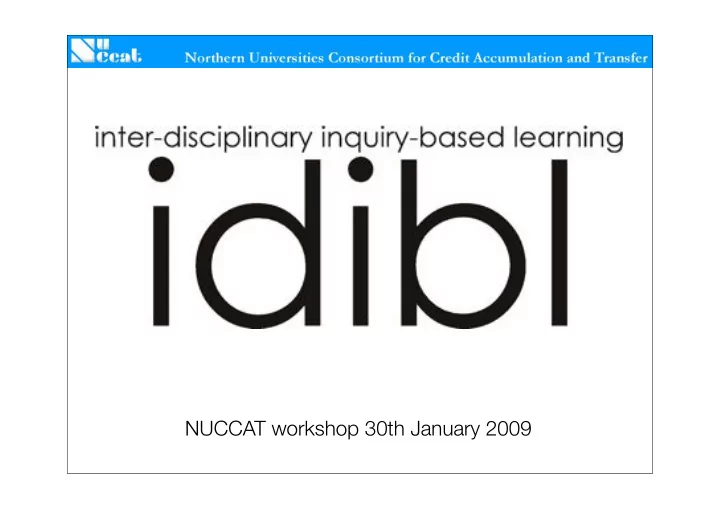

NUCCAT workshop 30th January 2009
10:10 - 10:30 The story of Ultraversity and IDIBL - context, values and approaches • the case for social justice / widening participation for individuals • raising the quality of learning and the degree of impact on practice and workplace • combination of innovative approaches adopted • 'Patterns' - staff development to adopt innovation
The Inter-Disciplinary Inquiry-Based Learning Project (IDIBL) project was initiated in August 2007 and sets out to reach students for whom traditional university courses do not fit.
Ultraversity - 148 graduates in 2006 …over 250 by 2008
2003 2004 2005 2006 2007 2008 August 2007 January 2003 • IDIBL project starts • Ultraversity project starts May 2008 � May 2003 • Validated new framework & • Ultraversity validated Masters in Learning with Technology � July 2003 • Ultraversity recruits 300 September 2008 students • Recruited 9 students for Masters LwT July 2006 • Masters module is CPD for � • Ultraversity graduates 148 new staff in UAE students November 2008 � 2005 • Validated Regeneration & • Ultraversity revalidated for Sustainable Communities 15-30 credit restructure Future developments February 2006 • Foundation degree in • Bournemouth MA Creative School Administration Media Practice validated • Foundation Degrees at ARU
University of Bolton - IDIBL framework validated May 2008
Level 7 Organisational Improvement (30 credits) 7
Benefits for: Flexibility Student University Employer in: Full time work, family, Time Timetable, staffing No release needed best time for learning As above and best No rooms, no car Place As above place to study parking Finding voice, Retention, graduate Communicative Assessment creativity, technology competencies employees Motivation, Retention, focus on Negotiated perseverance, process quality, Relevance curriculum meaningfulness. relevance to society. Practitioner data eg Action Basis in ‘delight’ - zest Effective collection of case Inquiry and interest improvement studies
Organisational improvement Higher Education funding body Traditional Negotiation work-based about student Improvement assured learning numbers University Learning individually & frequently re-negotiated to meet needs of Learning ‘diet’ student and employer delivered Process One-size-fits-all curriculum content Student Student designed curriculum agreed Personal development planning Personal and Employer development organisational improvement planning planning organisation
11:00 Report back 11
11:30 - 11:50 IDIBL - themes, frameworks and modules • impact potential - social responsibility • inter-professional and inter-disciplinary • framework - levels and credit volume, progression • drilling down into a module design - learning outcomes, assessment criteria & practice
Objective Learning outcomes at Level 7 - the postgraduate with Masters Degree will be able to: 1. Action for improvement to create Independently identify opportunities to take actions for improvement at an organisational level, systematically implement innovative solutions curious, evaluative and effective and critically evaluate the outcomes. 'improvers' in society 2. Scholarly research to assure the quality Undertake a significant piece of research that fully and critically explores key issues demonstrating rigor in the research process. of improvement is based on best evidence, analysis and insight Synthesize sources and communicate orally, in writing, and in 3. Communication for effective appropriate media, in academic and professional contexts making well dissemination of improved practice informed, coherent and persuasive arguments. Critically analyse and evaluate complex issues and lead reasoned 4. Application of subject and argument around topics of debate or controversy drawing on knowledge professional knowledge for depth of at the forefront of their field including a historical perspective. understanding of practice Take a leadership role to articulate philosophies of lifelong learning, the 5. Learning and working with others to applications of technology, and the way organisations work. sustain lifelong learning and community of practice Use organisational theories to inform analysis and evaluation of their 7. Organisation and policy to act on wider work context at a strategic level, critiquing local and national policies contexts of organisation and society and develop recommendations for change. Analyse and manage the implications of ethical dilemmas including 8. Ethics to maintain integrity and respect social implications of activities and work pro-actively with others to for individuals and society formulate solutions. Evaluate technology for its contribution to communication, co-ordination 9. Technology to enhance creativity, and an organisation's enterprise activities. confidence and competence with technology as a modern practitioner
12:30 Report back 15
Part 3 13:50 - 14:10 The ‘Co-educate’ Project
Concerns: • productivity agreement - 550 hours? • assessment - let's stop marking? • staff development • articulating the argument for action inquiry et al • university enterprise systems - technical, pedagogical and administrative CO-EDUCATE Jisc Curriculum Development Project to address systemic change issues
Aim Develop a technologically supported approach to programme development that is efficient, agile and responsive to purchaser and learner needs while protecting the rigour and quality of the existing validation mechanisms. Objectives: • development of collaborative and transparent processes for initial course identification & curriculum design across the UoB & with stakeholders; • cross-institutional buy-in to the identification and implementation of the new practices required to develop courses • cross-institutional capacity building in the ability to critically examine and develop the UoB work-focussed curricula • embedding of inquiry-based learning including negotiated learning in work-focussed programmes offered by the UoB
14:40 Report back
Recommend
More recommend